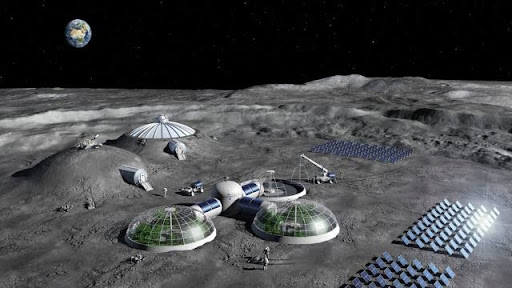Free Courses Sale ends Soon, Get It Now


Free Courses Sale ends Soon, Get It Now



Disclaimer: Copyright infringement is not intended.
The European Space Agency (ESA) launched the Moonlight Lunar Communications and Navigation Services (LCNS) programme at the International Astronautical Congress.
|
About |
It is a programme to make Europe’s first-ever dedicated satellite constellation for telecommunication and navigation services for the Moon. It is a collaborative mission involving the European Space Agency(ESA), various nations, and industrial partners, led by ESA. |
|
Purpose |
Its main purpose is to establish a constellation of about five lunar satellites for telecommunication and navigation services for the Moon. It also aims to leverage technologies developed from the Moonlight programme to develop Mars Communication and Navigation Infrastructure (MARCONI) for future Mars missions. The MARCONI is a proposed programme by the European Space Agency (ESA) to develop a network of satellites to provide communication and navigation services for Mars. |
|
First Launch |
Lunar Pathfinder is a communications relay satellite built by Surrey Satellite Technology LTD. It is the first satellite of the programme which is scheduled for launch in 2026. |
|
Operational Timeline |
Its initial services are expected by the end of 2028 and it is expected to be fully operational by 2030. |
|
Focus Area |
The programme will focus on the Moon’s South Pole. The South Pole is crucial because the mountain peaks near the South Pole are illuminated for large periods of time, which provides a source of energy. The South Pole also contains water ice, which could be a valuable resource for drinking water, cooling equipment, and producing fuel and oxygen. |
|
Significance |
The mission will do away with the need to have a standalone communication system and countries can now concentrate on astronauts and robotics. Moonlight will provide the testing of instruments and facilities in lunar conditions and contribute to a multi-planetary future. This will help us better understand the performance of these facilities in environments other than Earth. The programme will enable data transfer to over 250,000 miles or 400,000 kilometres, between Earth and the Moon. |
Important articles for reference
Chandrayaan 3 and lunar Missions
Sources:
|
PRACTICE QUESTION Q.Consider the following statements about the “Moonlight Programme” recently seen in the news:
How many of the above statements is/are correct? A.Only one B.Only two C. All Three D.None Answer: B Explanation: Statement 1 is correct: It is a programme to make Europe’s first-ever dedicated satellite constellation for telecommunication and navigation services for the Moon. It is a collaborative mission involving the European Space Agency(ESA), various nations, and industrial partners, led by ESA. Statement 2 is correct: Its main purpose is to establish a constellation of about five lunar satellites for telecommunication and navigation services for the Moon. It also aims to leverage technologies developped from the Moonlight programme to develop Mars Communication and Navigation Infrastructure (MARCONI) for future Mars missions. The MARCONI is a proposed programme by the European Space Agency (ESA) to develop a network of satellites to provide communication and navigation services for Mars. Statement 3 is incorrect: The programme will focus on the Moon’s South Pole. The South Pole is crucial because the mountain peaks near the south pole are illuminated for large periods of time, which provide a source of energy. The South Pole also contains water ice, which could be a valuable resource for drinking water, cooling equipment, and producing fuel and oxygen. |
© 2024 iasgyan. All right reserved